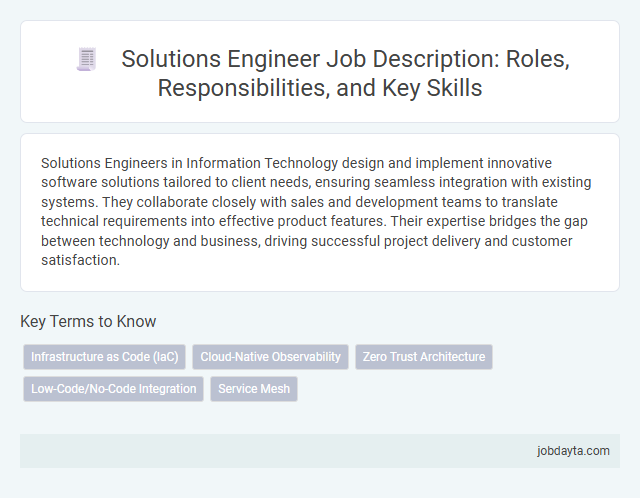Solutions Engineers in Information Technology design and implement innovative software solutions tailored to client needs, ensuring seamless integration with existing systems. They collaborate closely with sales and development teams to translate technical requirements into effective product features. Their expertise bridges the gap between technology and business, driving successful project delivery and customer satisfaction.
Introduction to Solutions Engineer Role
A Solutions Engineer bridges the gap between complex technology and business needs by designing tailored IT solutions. They collaborate with clients to understand requirements and translate them into technical strategies. This role requires expertise in both technical knowledge and communication skills to ensure successful solution implementation.
Core Responsibilities of a Solutions Engineer
A Solutions Engineer analyzes complex technical requirements and designs tailored IT solutions that align with business objectives. They collaborate closely with sales and engineering teams to ensure seamless implementation and integration of products.
Your role involves troubleshooting challenges throughout the deployment process and providing expert guidance to optimize system performance. Ensuring clear communication between stakeholders and maintaining up-to-date technical documentation is essential for project success.
Essential Technical Skills for Solutions Engineers
Solutions Engineers bridge the gap between complex technical products and client needs. Mastery of specific technical skills is crucial for effective solution design and implementation.
- Technical Product Knowledge - In-depth understanding of software, hardware, and network solutions enables tailored client recommendations.
- Programming and Scripting - Proficiency in languages like Python, JavaScript, or SQL allows customization and integration of solutions.
- Cloud Computing Expertise - Familiarity with AWS, Azure, or Google Cloud platforms supports scalable and flexible solution deployment.
Communication and Collaboration in Solutions Engineering
Solutions Engineers play a crucial role in bridging technical expertise and client communication. They translate complex technical concepts into clear, actionable solutions to meet client needs.
Effective communication enhances collaboration between cross-functional teams, ensuring seamless project execution. Solutions Engineers facilitate understanding among developers, sales, and stakeholders, aligning goals and expectations. Their ability to convey technical details improves problem-solving and accelerates innovation in IT environments.
Problem-Solving and Analytical Abilities Needed
Solutions Engineers play a critical role in bridging technical expertise with client needs to deliver effective IT solutions. Strong problem-solving and analytical abilities enable them to diagnose challenges quickly and develop innovative strategies.
- Technical Troubleshooting - Identifying root causes of system issues using systematic analysis and diagnostic tools ensures efficient resolution.
- Data-Driven Decision Making - Analyzing complex datasets helps in crafting tailored solutions aligned with business goals.
- Creative Problem Solving - Applying lateral thinking to overcome novel IT challenges supports continuous improvement and innovation.
Educational Background and Certifications
| Educational Background |
|
|---|---|
| Certifications |
|
Tools and Technologies Used by Solutions Engineers
Solutions Engineers utilize a wide range of tools and technologies to design and implement effective IT solutions. Key tools include cloud platforms like AWS and Azure, automation frameworks such as Ansible and Terraform, and collaboration software like Jira and Confluence. Your ability to master these technologies ensures seamless integration and customized solutions for complex business challenges.
Career Path and Advancement Opportunities
A Solutions Engineer plays a critical role in bridging the gap between technical teams and client needs by designing and implementing effective IT solutions. This career path offers diverse advancement opportunities through skill development and industry experience.
- Entry-Level Roles - Positions such as Junior Solutions Engineer focus on building foundational knowledge in system architecture and client interaction.
- Mid-Level Positions - Roles like Solutions Engineer involve managing complex projects and collaborating with cross-functional teams to deliver scalable solutions.
- Senior and Leadership Opportunities - Advancement includes becoming a Senior Solutions Engineer or Solutions Architect, overseeing technical strategy and mentoring junior staff.
Continuous learning and certifications in cloud computing, cybersecurity, and software development accelerate career growth within this dynamic field.
Challenges Faced by Solutions Engineers
What are the main challenges faced by Solutions Engineers in today's IT landscape? Rapid technological advancements demand continuous learning and adaptation to new tools and platforms. Balancing technical expertise with clear communication to bridge client needs and engineering capabilities remains complex.
Tips for Writing an Effective Solutions Engineer Job Description
Crafting an effective Solutions Engineer job description requires clear articulation of technical skills and problem-solving abilities. Highlight key responsibilities such as designing tailored IT solutions and collaborating with sales teams to meet client needs.
Emphasize qualifications like proficiency in cloud computing, software development, and customer communication. Including measurable outcomes and desired certifications enhances candidate attraction and job relevance.
Related Important Terms
Infrastructure as Code (IaC)
A Solutions Engineer specializing in Infrastructure as Code (IaC) designs and implements automated, scalable infrastructure deployments using tools like Terraform, Ansible, and AWS CloudFormation, optimizing cloud resource management and reducing manual configuration errors. Expertise in IaC enables seamless integration with CI/CD pipelines, ensuring consistent environment provisioning and accelerating application delivery.
Cloud-Native Observability
Solutions Engineers specializing in Cloud-Native Observability design and implement monitoring architectures that leverage Kubernetes, Prometheus, and OpenTelemetry to optimize application performance and reliability in dynamic cloud environments. Their expertise ensures real-time visibility into distributed systems, enabling proactive issue detection and seamless integration with CI/CD pipelines for continuous improvement.
Zero Trust Architecture
Solutions Engineers specializing in Zero Trust Architecture design and implement security frameworks that verify every user and device before granting access to resources, minimizing the risk of cyber threats and data breaches. They leverage advanced identity verification, micro-segmentation, and continuous monitoring technologies to create a robust, adaptive defense strategy tailored for modern IT environments.
Low-Code/No-Code Integration
Solutions Engineers specializing in Low-Code/No-Code Integration streamline application development by enabling seamless connectivity between diverse software platforms without extensive coding. Their expertise accelerates deployment, reduces development costs, and empowers business users to automate workflows through intuitive drag-and-drop interfaces.
Service Mesh
Solutions Engineers specializing in Service Mesh design and implement scalable microservices architectures using tools like Istio and Linkerd to enhance application observability, security, and traffic management. They optimize service-to-service communication by integrating policy enforcement, telemetry data collection, and fault tolerance within cloud-native environments.
Solutions Engineer Infographic

 jobdayta.com
jobdayta.com